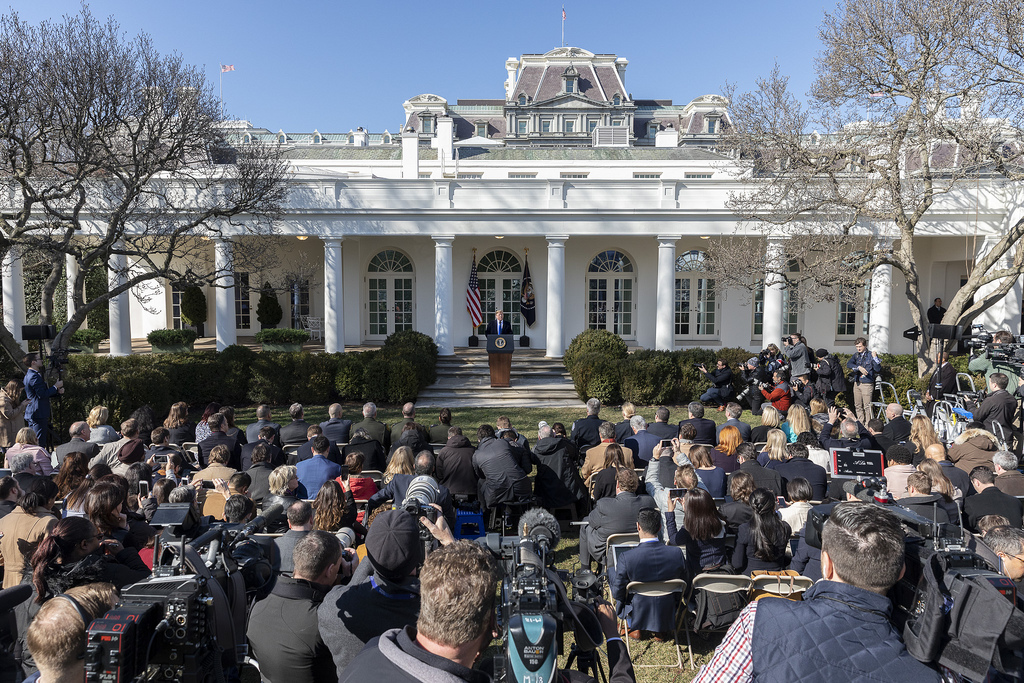Congress Should Limit the Emergency Powers of All Presidents
President Trump claims that the law allows him to spend billions of dollars on a wall that Congress refused to fund. House Democrats, along with Republican Rep. Justin Amash, have introduced a joint resolution that would rescind the emergency proclamation. That proposal is an important start, but Congress should do more.

President Trump claims that the law allows him to spend billions of dollars on a wall that Congress refused to fund. House Democrats, along with Republican Rep. Justin Amash, have introduced a joint resolution that would rescind the emergency proclamation. That proposal is an important start, but Congress should do more. Instead of merely blocking Trump’s efforts, Congress should proactively limit the emergency powers of all presidents. Republicans and Democrats alike should restrict how long emergency proclamations can last. This salutary change would restore the separation of powers, regardless of which party is in power.
In 1976, Congress enacted the National Emergencies Act (NEA). This law was designed to give the president certain authorities and the ability to spend money in response to exigent circumstances. A related provision allows the Pentagon to shift around budgeted funds to “undertake military construction projects” during an emergency. In theory at least, this law makes eminent sense. Consider a hypothetical scenario: During World War II, it would have made sense for the military to have the latitude to build fortifications in New York harbor to prevent a threatened U-boat attack. Until Congress can convene, and appropriate funds, the republic should have an energetic executive branch to deal with imminent threats. Yet that exigency should last only so long. An emergency declaration can—and often does—last indefinitely.
Under the NEA, Congress can rescind an emergency declaration through a simple majority vote. The House now seems primed to take the first steps in that direction. However, the president can—and likely would—veto that joint resolution. As a result, Congress would have to override that veto with a two-thirds vote in the House and the Senate. If Congress cannot muster the votes, the state of emergency remains. The president merely has to publish an annual notice in the Federal Register to extend the emergency. There are currently 31 emergencies in effect, including one initiated in 1979 during the Iran hostage crisis.
The NEA can be improved. As a threshold matter, Congress failed to define the term “emergency.” Currently, it means whatever the president wants it to mean. While it is tempting to legislate in advance what types of dire circumstances would constitute an emergency, this approach would be a mistake. Dynamic threats to the homeland are changing constantly. It would be shortsighted for Congress to anticipate specific types of exigent circumstances that could justify a swift response.
A far better approach would impose meaningful limits on how long those powers can last. Specifically, Congress should look to the War Powers Resolution of 1973 for guidance. This familiar law limits how the president can respond to volatile military threats without a declaration of war. The president is required to notify Congress within 48 hours of introducing armed forces into “hostilities” abroad. Those forces can remain engaged for 60 days, plus a 30-day withdrawal period, unless Congress authorizes further engagements.
The War Powers Resolution’s track record is far from perfect. Presidents of both parties have turned linguistic somersaults to avoid the strictures of the law. (For example, the Obama administration determined that its military incursions into Libya did not constitute “hostilities.”) However, the resolution strikes the right balance: The president can unilaterally take action to respond to exigent threats, but that authority sunsets after three months. At that time, Congress would have to approve further uses of force. And though there have been long-standing doubts concerning the resolution’s constitutionality—specifically, presidents of both parties have suggested that the law may intrude on inherent Article II powers—that argument does not apply to domestic “emergencies.” On the homefront, Congress has plenary power over federal construction projects and similar expenditures. (Notably, Trump’s proclamation to build the wall did not rely on any power in Article II.)
If that model works for emergencies abroad, it would also work for emergencies at home. Congress should modify the NEA such that all emergency declarations automatically sunset after three months. At that point, the president would need to ask Congress for new authority to continue the emergency. This approach is far more desirable than the current system, in which Congress has to override a veto to halt the emergency. In other words, the burden should be on the president to seek permission, not on Congress to deny it.
Congress must take seriously its constitutional role during times of war and peace. If Congress has enough votes to terminate the present emergency and override Trump’s veto, it should use that same support to prevent this problem from recurring. It is not enough to stop Trump because Democrats oppose a border wall. Or to simply rescind this emergency authority because members of Congress on both sides of the aisle are uncomfortable with the actions of this particular president. To maintain the separation of powers, Congress must reassert its constitutional mandate to legislate and appropriate, rather than lazily passing a blank check to the White House—regardless of who resides in it.





